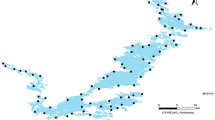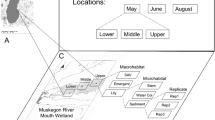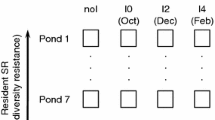Abstract
Ecological theory suggests that a combination of local and regional factors regulate biodiversity and community functioning in metacommunities. The relative importance of different factors structuring communities likely changes over successional time, but to date this concept is scarcely documented. In addition, the few studies describing successional dynamics in metacommunity regulation have only focused on a single group of organisms. Here, we report results of an experimental study testing the effect size of initial local community composition and dispersal between local patches on community dynamics of benthic microalgae and their associated bacteria over community succession. Our results show that over time dispersal outweighed initial effects of community composition on microalgal evenness and biomass, microalgal β-diversity, and the ratio of bacteria to microalgae. At the end of the experiment (ca. 20 microalgae generations), dispersal significantly decreased microalgal evenness and β-diversity by promoting one regionally superior competitor. Dispersal also decreased the ratio of bacteria to microalgae, while it significantly increased microalgal biomass. These results suggest that the dispersal-mediated establishment of a dominant and superior microalgae species prevented bacteria from gaining competitive advantage over the autotrophs in these metacommunities, ultimately maintaining the provision of autotrophic biomass. Our study emphasizes the importance of time for dispersal to be a relevant community-structuring mechanism. Moreover, we highlight the need for considering multiple competitors in complex metacommunity systems to properly pinpoint the consequences of local change in dominance through dispersal for metacommunity function.




Similar content being viewed by others
References
Admiraal W, Peletier H, Brouwen T (1984) The seasonal succession patterns of diatom species on an intertidal mudflat: an experimental analysis. Oikos 42:30–40. https://doi.org/10.2307/3544606
Amin SA, Parker MS, Armbrust EV (2012) Interactions between diatoms and bacteria. Microbiol Mol Biol Rev 76:667–684. https://doi.org/10.1128/MMBR.00007-12
Baillie PW (1986) Oxygenation of intertidal estuarine sediments by benthic microalgal photosynthesis. Estuar Coast Shelf Sci. https://doi.org/10.1016/0272-7714(86)90110-1
Wilsey BJ, Potvin C (2000) Biodiversity and ecosystem functioning: importance of species evenness in an old field. Ecol. 81:887–892. https://doi.org/10.1890/0012-9658(2000)081%5b0887:BAEFIO%5d2.0.CO;2
Bratbak G, Thingstad T (1985) Phytoplankton-bacteria interactions: an apparent paradox? Analysis of a model system with both competition and commensalism. Mar Ecol Prog Ser 25:23–30. https://doi.org/10.3354/meps025023
Cadotte MW (2006) Dispersal and species diversity: a meta-analysis. Am Nat 167:913–924. https://doi.org/10.1086/504850
Cadotte MW, Mai DV, Jantz S, Collins MD, Keele M, Drake JA (2006) On testing the competition-colonization trade-off in a multispecies assemblage. Am Nat 168:704–709. https://doi.org/10.1086/508296
Carini P, Marsden PJ, Leff JW, Morgan EE, Strickland MS, Fierer N (2016) Relic DNA is abundant in soil and obscures estimates of soil microbial diversity. Nat Microbiol 2:16242. https://doi.org/10.1038/nmicrobiol.2016.242
Chen S, Chmura GL, Wang Y, Yu D, Ou D, Chen B, Ye Y, Chen G (2019) Benthic microalgae offset the sediment carbon dioxide emission in subtropical mangrove in cold seasons. Limnol Oceanogr 64:1297–1308. https://doi.org/10.1002/lno.11116
Cole JJ (1982) Interactions between bacteria and algae in aquatic ecosystems. Annu Rev Ecol Syst 13:291–314. https://doi.org/10.1146/annurev.es.13.110182.001451
Danger M, Leflaive J, Oumarou C, Ten-Hage L, Lacroix G (2007) Control of phytoplankton-bacteria interactions by stoichiometric constraints. Oikos 116:1079–1086. https://doi.org/10.1111/j.0030-1299.2007.15424.x
de Boer MK, Moor H, Matthiessen B, Hillebrand H, Eriksson BK (2014) Dispersal restricts local biomass but promotes the recovery of metacommunities after temperature stress. Oikos 123:762–768. https://doi.org/10.1111/j.1600-0706.2013.00927.x
de Meester L, Vanoverbeke J, Kilsdonk LJ, Urban MC (2016) Evolving perspectives on monopolization and priority effects. Trends Ecol Evol 31:136–146. https://doi.org/10.1016/j.tree.2015.12.009
Decho AW (2000) Microbial biofilms in intertidal systems: an overview. Cont Shelf Res 20:1257–1273. https://doi.org/10.1016/S0278-4343(00)00022-4
Dini-Andreote F, de e Silva MCP, Triado-Margarit X, Casamayor EO, van Elsas JD, Salles JF (2014) Dynamics of bacterial community succession in a salt marsh chronosequence: evidences for temporal niche partitioning. ISME J 8:1989–2001. https://doi.org/10.1038/ismej.2014.54
Doi H, Chang KH, Nakano SI (2010) Dispersal, connectivity, and local conditions determine zooplankton community composition in artificially connected ponds. Aquat Biol 10:47–55. https://doi.org/10.3354/ab00262
Eggers SL, Matthiessen B (2013) Initial dominance in coccolithophore communities affects community structure but does not translate into altered community functioning. Mar Ecol Prog Ser 473:67–77. https://doi.org/10.3354/meps10064
Eggers SL, Eriksson BK, Matthiessen B (2012) A heat wave and dispersal cause dominance shift and decrease biomass in experimental metacommunities. Oikos 121:721–733. https://doi.org/10.1111/j.1600-0706.2011.19714.x
Evrard V, Huettel M, Cook PLM, Soetaert K, Heip CHR, Middelburg JJ (2012) Importance of phytodetritus and microphytobenthos for heterotrophs in a shallow subtidal sandy sediment. Mar Ecol Prog Ser 455:13–31. https://doi.org/10.3354/meps09676
Filstrup CT, Hillebrand H, Heathcote AJ, Harpole WS, Downing JA (2014) Cyanobacteria dominance influences resource use efficiency and community turnover in phytoplankton and zooplankton communities. Ecol Lett 17:464–474. https://doi.org/10.1111/ele.12246
Fukami T, Bezemer TM, Mortimer SR, van der Putten WH (2005) Species divergence and trait convergence in experimental plant community assembly. Ecol Lett 8:1283–1290. https://doi.org/10.1111/j.1461-0248.2005.00829.x
Fukami T, Dickie IA, Paula Wilkie J, Paulus BC, Park D, Roberts A, Buchanan PK, Allen RB (2010) Assembly history dictates ecosystem functioning: evidence from wood decomposer communities. Ecol Lett 13:675–684. https://doi.org/10.1111/j.1461-0248.2010.01465.x
Gilpin ME, Hanski I (1991) Metapopulation dynamics: Empirical and theoretical investigations. Academic Press, London. https://doi.org/10.1016/B978-0-12-284120-0.X5001-3
Graham MH, Edwards MS (2001) Statistical significance versus fit: estimating the importance of individual factors in ecological analysis of variance. Oikos 93:505–513. https://doi.org/10.1034/j.1600-0706.2001.930317.x
Grainger TN, Gilbert B (2016) Dispersal and diversity in experimental metacommunities: linking theory and practice. Oikos 125:1213–1223. https://doi.org/10.1111/oik.03018
Grover JP (2000) Resource competition and community structure in aquatic micro-organisms: experimental studies of algae and bacteria along a gradient of organic carbon to inorganic phosphorus supply. J Plankton Res 22:1591–1610. https://doi.org/10.1093/plankt/22.8.1591
Hillebrand H, Lehmpfuhl V (2011) Resource stoichiometry and consumers control the biodiversity-productivity relationship in pelagic metacommunities. Am Nat 178:171–181. https://doi.org/10.1086/660831
Hillebrand H, Dürselen C-D, Kirschtel D, Pollingher U, Zohary T (1999) Biovolume calculation for pelagic and benthic microalgae. J Phycol 424:403–424. https://doi.org/10.1046/j.1529-8817.1999.3520403.x
Holyoak M, Leibold MA, Holt RD (2005) Metacommunities: Spatial dynamics and ecological communities. University of Chicago Press, Chicago
Howeth JG, Leibold MA (2010) Species dispersal rates alter diversity and ecosystem stability in pond metacommunities. Ecol 91:2727–2741. https://doi.org/10.1890/09-1004.1
Jansson M (1988) Phosphate uptake and utilization by bacteria and algae. Hydrobiol 170:177–189. https://doi.org/10.1007/BF00024904
Kneitel JM, Miller TE (2003) Dispersal rates affect species composition in metacommunities of Sarracenia purpurea inquilines. Am Nat 162:165–171. https://doi.org/10.1086/376585
Lancaster J, Downes BJ (2017) A landscape-scale field experiment reveals the importance of dispersal in a resource-limited metacommunity. Ecol 98:565–575. https://doi.org/10.1002/ecy.1671
Leibold MA, Holyoak M, Mouquet N, Amarasekare P, Chase JM, Hoopes MF, Holt RD, Shurin JB, Law R, Tilman D, Loreau M, Gonzalez A (2004) The metacommunity concept: a framework for multi-scale community ecology. Ecol Lett 7:601–613. https://doi.org/10.1111/j.1461-0248.2004.00608.x
Levins R, Culver D (1971) Regional coexistence of species and competition between rare species. Proc Natl Acad Sci USA. 68:1246–1248. https://doi.org/10.1073/pnas.68.6.1246
Limberger R, Wickham SA (2012) Transitory versus persistent effects of connectivity in environmentally homogeneous metacommunities. PLoS ONE 7:e44555. https://doi.org/10.1371/journal.pone.0044555
Lindström ES, Östman Ö (2011) The importance of dispersal for bacterial community composition and functioning. PLoS ONE 6:e25883. https://doi.org/10.1371/journal.pone.0025883
Løvdal T, Tanaka T, Thingstad TF (2007) Algal-bacterial competition for phosphorus from dissolved DNA, ATP, and orthophosphate in a mesocosm experiment. Limnol Oceanogr 52:1407–1419. https://doi.org/10.4319/lo.2007.52.4.1407
MacIntyre HL, Geider RJ, Miller DC (1996) Microphytobenthos: the ecological role of the “secret garden” of unvegetated, shallow-water marine habitats. I. Distribution, abundance and primary production. Estuaries 19:186–201. https://doi.org/10.2307/1352224
Matthiessen B, Mielke E, Sommer U (2010) Dispersal decreases diversity in heterogeneous metacommunities by enhancing regional competition. Ecol 91:2022–2033. https://doi.org/10.1890/09-1395.1
Mattingly WB, Hewlate R, Reynolds HL (2007) Species evenness and invasion resistance of experimental grassland communities. Oikos 116:1164–1170. https://doi.org/10.1111/j.0030-1299.2007.15406.x
Mouquet N, Loreau M (2003) Community patterns in source-sink metacommunities. Am Nat 162:544–557. https://doi.org/10.1086/378857
Mulder CPH, Bazeley-White E, Dimitrakopoulos PG, Hector A, Scherer-Lorenzen M, Schmid B (2004) Species evenness and productivity in experimental plant communities. Oikos 107:50–63. https://doi.org/10.1111/j.0030-1299.2004.13110.x
Olejnik S, Algina J (2003) Generalized Eta and Omega squared statistics: measures of effect size for some common research designs. Psychol Methods 8:434–447. https://doi.org/10.1037/1082-989X.8.4.434
Pei AY, Oberdorf WE, Nossa CW, Agarwal A, Chokshi P, Gerz EA, Jin Z, Lee P, Yang L, Poles M, Brown SM, Sotero S, DeSantis T, Brodie E, Nelson K, Pei Z (2010) Diversity of 16S rRNA genes within individual prokaryotic genomes. Appl Environ Microbiol 76:3886–3897. https://doi.org/10.1128/AEM.02953-09
Pu Z, Jiang L (2015) Dispersal among local communities does not reduce historical contingencies during metacommunity assembly. Oikos 124:1327–1336. https://doi.org/10.1111/oik.02079
R CoreTeam (2017) R: A language and environment for statistical computing. R Foundation for Statistical Computing, Vienna
Sferra CO, Hart JL, Howeth JG (2017) Habitat age influences metacommunity assembly and species richness in successional pond ecosystems. Ecosphere 8:e01871. https://doi.org/10.1002/ecs2.1871
Shurin JB, Amarasekare P, Chase JM, Holt RD, Hoopes MF, Leibold MA (2004) Alternative stable states and regional community structure. J Theor Biol 227:359–368. https://doi.org/10.1016/j.jtbi.2003.11.013
Sun D-L, Jiang X, Wu QL, Zhou N-Y (2013) Intragenomic heterogeneity of 16S rRNA genes causes overestimation of prokaryotic diversity. Appl Environ Microbiol 79:5962–5969. https://doi.org/10.1128/AEM.01282-13
Sundbäck K, Miles A, Göransson E (2000) Nitrogen fluxes, denitrification and the role of microphytobenthos in microtidal shallow-water sediments: an annual study. Mar Ecol Prog Ser 200:59–76. https://doi.org/10.3354/meps200059
Svensson F, Norberg J, Snoeijs P (2014) Diatom cell size, coloniality and motility: trade-offs between temperature, salinity and nutrient supply with climate change. PLoS ONE 9(10):e109993. https://doi.org/10.1371/journal.pone.0109993
Thingstad TF, Pengerud B (1985) Fate and effect of allochthonous organic material in aquatic microbial ecosystems. An analysis based on chemostat theory. Mar Ecol Prog Ser 21:47–62. https://doi.org/10.3354/meps021047
Thingstad TF, Skjoldal EF, Bohne RA (1993) Phosphorus cycling and algal-bacterial competition in Sandsfjord, western Norway. Mar Ecol Prog Ser 99:239–259. https://doi.org/10.3354/meps099239
Tilman D, Lehman CL, Thomson KT (1997) Plant diversity and ecosystem productivity: theoretical considerations. Proc Natl Acad Sci USA. 94:1857–1861. https://doi.org/10.1073/pnas.94.5.1857
Underwood GJC, Kromkamp J (1999) Primary production by phytoplankton and microphytobenthos in estuaries. Advanc Ecol Res 29:93–153. https://doi.org/10.1016/S0065-2504(08)60192-0
Underwood GJC, Paterson DM (1993) Recovery of intertidal benthic diatoms after biocide treatment and associated sediment dynamics. J Mar Biol Assoc UK 73:22–45. https://doi.org/10.1017/S002531540003263X
Underwood GJC, Smith DJ (1998) Predicting epipelic diatom exopolymer concentrations in intertidal sediments from sediment Chlorophyll a. Microb Ecol 35:116–125. https://doi.org/10.1007/s002489900066
Urban MC, de Meester L (2009) Community monopolization: local adaptation enhances priority effects in an evolving metacommunity. Proc R Soc B: Biol Sci 276:4129–4138. https://doi.org/10.1098/rspb.2009.1382
Utermöhl H (1958) Zur Vervollkommnung der quantitativen Phytoplankton Methodik. Mitt Int Ver Theor Angew Limnol 9:263–272
Wilson DS (1992) Complex interactions in metacommunities, with implications for biodiversity and higher levels of selection. Ecol 73:1984–2000. https://doi.org/10.2307/1941449
Yallop ML, de Winder B, Paterson DM, Stal LJ (1994) Comparative structure, primary production and biogenic stabilization of cohesive and non-cohesive marine sediments inhabited by microphytobenthos. Estuar Coast Shelf Sci 39:565–582. https://doi.org/10.1016/S0272-7714(06)80010-7
Yallop ML, Paterson DM, Wellsbury P (2000) Interrelationships between rates of microbial production, exopolymer production, microbial biomass, and sediment stability in biofilms of intertidal sediments. Microb Ecol 39:116–127. https://doi.org/10.1007/s002489900186
Zha Y, Berga M, Comte J, Langenheder S (2016) Effects of dispersal and initial diversity on the composition and functional performance of bacterial communities. PLoS ONE 11:1–14. https://doi.org/10.1371/journal.pone.0155239
Acknowledgements
We thank Linnea Sandell and Irene Marring for assistance with sample collection and lab work. The research in this manuscript was supported by an Ubbo Emmius PhD scholarship from the University of Groningen granted to FGE.
Author information
Authors and Affiliations
Contributions
BKE, BM and FGE conceived and designed the experiment; FGE performed the experiment with the help of BKE and FDA; FGE and FDA conducted fieldwork; FDA, MJdLB and JFS generated sequencing data and molecular analyses for bacteria; FGE and BM analyzed the microalgae data; FGE, BM and BKE wrote the manuscript; other authors provided editorial advice.
Corresponding author
Ethics declarations
Ethical approval
This article does not contain any studies with human participants or animals performed by any of the authors.
Conflict of interest
The authors declare that they have no conflict of interest.
Additional information
Communicated by Bryan Brown.
Electronic supplementary material
Below is the link to the electronic supplementary material.
Rights and permissions
About this article
Cite this article
Engel, F.G., Dini-Andreote, F., Eriksson, B.K. et al. Dispersal mitigates bacterial dominance over microalgal competitor in metacommunities. Oecologia 193, 677–687 (2020). https://doi.org/10.1007/s00442-020-04707-8
Received:
Accepted:
Published:
Issue Date:
DOI: https://doi.org/10.1007/s00442-020-04707-8




